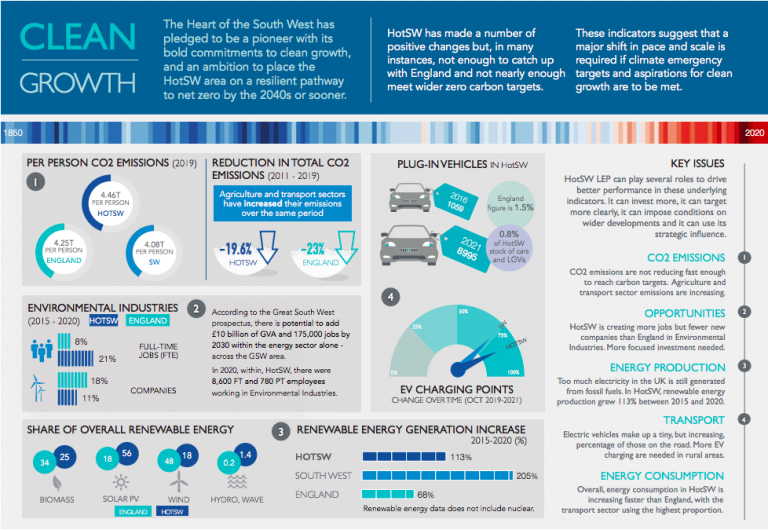Introduction David Ralph, HotSW LEP CEO

Following Covid-19 and Brexit, there is no doubt in my mind that the UK economy will need to transform; to deliver net zero, to deliver to new markets, to digitalise, and to exploit technology to drive productivity and prosperity. Increasingly, the South West feels at the very heart of this transformation, with our clean and inclusive agenda and focus on Digital, Ocean, Sustainable Aviation and Energy Futures.
Clearly, cost of living challenges are severe at the moment, and this is starting to bite on discretionary spend. The labour market continues to be a real structural issue, with more over 50s in the South West taking early retirement than in any other region. This is leaving many sectors short of labour, and whilst there is a bit of cover through students over the summer months, businesses will without question need to be increasingly agile and flexible in securing the labour they need. I suspect many will turn to automation and technology. Of course this requires investment, and I hope support like the super-deduction continues to add to the suite of tools available for businesses to invest.
Additionally, it is our most disadvantaged places and people who disproportionately feel the impact of challenging times. Social mobility – or lack of it – is a huge structural issue for the South West, but isn’t a quick fix. We need to develop a generational route map to try to tackle this long term, starting in schools, but with business taking a full and active role to support the workforce of the future. If business needs labour, it will need to build its relationship with schools as well as colleges.
I think therefore we are looking at the economy and our actions in two ways – the need for short term support through local interventions such as shared prosperity funds and levelling up funds, but also extending our relationship with business to deliver a systems-led approach to transformational change.
In this month’s newsletter, take a look at insights into our economy and growth with our recently updated dashboards, read about the challenges facing the region’s rural sector and how we can tackle them, funding to boost skills in Somerset, and much more.
David Ralph
Chief Executive

Impact of payment scheme transition on rural economy cannot be ignored

This recent article by Mel Squires, LEP board member and regional director at NFU South West, for the Western Morning News, reflects on the wide impact of the transition from the agricultural Basic Payment Scheme (BPS), which is being phased out between now and 2027.
BPS is being replaced by new payments for delivering various environmental goals. The NFU has estimated that the average farm derives between a third and a half of its income from BPS, so this represents the biggest change to the financial structure of farming for a generation. Read the full article to discover how the transition will effect the South West economy and rural community.
Insights into the HotSW economy and growth
We regularly update our dashboards, which share insights and data into key challenges and opportunities facing the Heart of the South West, on issues including inclusivity, energy, jobs, skills, technological change, and more.
This month, take a look at our Economy dashboard, Clean Growth dashboard, and Inclusive Growth dashboard for the latest data which is helping us understand how we can improve productivity and prosperity for all.


Future looking bright for Plymouth’s marine sector

This year will see the Plymouth and South Devon Freeport become operational, the continued development of Smart Sound Plymouth, the Ocean Futures innovation support programme and the Plymouth Sound National Marine Park.
Developments over the past decade such as Smart Sound Plymouth, the Oceansgate marine Enterprise Zone and the Marine Business Technology Centre (MBTC) innovation support service have encouraged collaboration and creativity between the private and public sectors. Read the full article to learn more about Plymouth’s bright and innovative future.

Somerset receives funding boost to support people into skilled jobs

Somerset Council and Dorset County Council have been awarded nearly £1m funding from the Department for Education’s National Skills Fund to run a third round of Skills Bootcamps. The Train4Tomorrow Skills Bootcamps provide training up to 16 weeks long.
These courses provide adults with the opportunity to retrain into high-demand job roles in sectors that are emerging or rapidly growing. The next round of bootcamps will be running from July 2022 until March 2023, and provide industry-relevant and in-demand skills. Find out more about the Skills Bootcamps here.
Help to Grow business support programmes

The Department for Business, Energy & Industrial Strategy’s ‘Help to Grow: Management’ and ‘Help to Grow: Digital’ business support programmes are open to applications from small and medium sized businesses.
The two programmes intend to boost productivity and drive growth, with over half a billion pounds of funding, and to ensure that businesses are supported to emerge stronger from the COVID-19 pandemic, driving innovation, growth and job creation.

Hydrogen South West consortium to accelerate transition to net zero

A group of nine leading organisations covering aerospace, shipping, hi-tech engineering and public utilities have come together to launch Hydrogen South West, a partnership that will bring the benefits of hydrogen to the South West of England.
Focusing on key sectors such as shipping, aviation and housng as well as industry, the consortium comprises leading companies easyJet, Airbus and Hynamics (EDF); industrial heavyweights GKN Aerospace; consultants and engineers Costain and Wood; and regional leaders Bristol Port, Bristol Airport, and Wales and West Utilities.
Exeter Science Park opens net zero building
Exeter Science Park has marked the official opening of its £5 million George Parker Bidder building, built to net-zero carbon standards and supporting over 100 jobs, with a ceremonial tree planting.
The 14,000 square foot centre provides high-quality office and laboratory space for maturing science, technology, engineering, maths and medical (STEMM) businesses. Tenants of the new building include Remit Zero, Securious, Edson Tiger, Rx-info, Quanterra Systems, Concept First and Dashboard. Read more about the new George Parker Bidder building here.





